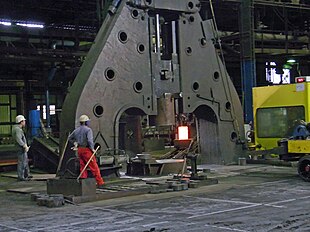
Back تطريق Arabic Коўка Byelorussian ধাতুগড়ন Bengali/Bangla Forja Catalan Kování (tváření) Czech Smedning Danish Schmieden German Σφυρηλάτηση Greek Forĝado Esperanto Forja Spanish


Forging is a manufacturing process involving the shaping of metal using localized compressive forces. The blows are delivered with a hammer (often a power hammer) or a die. Forging is often classified according to the temperature at which it is performed: cold forging (a type of cold working), warm forging, or hot forging (a type of hot working). For the latter two, the metal is heated, usually in a forge. Forged parts can range in weight from less than a kilogram to hundreds of metric tons.[1][2] Forging has been done by smiths for millennia; the traditional products were kitchenware, hardware, hand tools, edged weapons, cymbals, and jewellery.
Since the Industrial Revolution, forged parts are widely used in mechanisms and machines wherever a component requires high strength; such forgings usually require further processing (such as machining) to achieve a finished part. Today, forging is a major worldwide industry.[3]
- ^ Degarmo, p. 389
- ^ Cite error: The named reference
wnaForgewas invoked but never defined (see the help page). - ^ "Forging: The Early Years". All Metals & Forge Group. 22 January 2013. Archived from the original on 3 January 2018. Retrieved 1 October 2013.